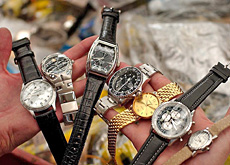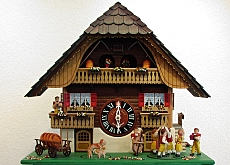Watchmakers pledge to keep up with the times

Swiss watchmakers have agreed to new regulations making it more difficult for timepieces to receive the Swiss Made label.
At its annual meeting on Thursday, the Federation of the Swiss Watch Industry said at least 80 per cent of the production costs for mechanical watches must be attributable to operations in Switzerland.
The percentage will be 60 per cent for other kinds of watches, particularly electronic ones, the industry said in a statement. This is the rate spelled out in the free-trade agreement between Switzerland and the European Union.
Exempted are raw materials, precious stones and batteries.
In future, technical construction and prototype development must also be carried out in Switzerland.
Federation president Jean-Daniel Pasche said he was convinced that the Swiss Made label requiring that only 50 per cent of costs are incurred in Switzerland needed to be strengthened.
He told the SonntagsZeitung newspaper that “many of the large brands fear the label is being devalued in the eyes of consumers”.
But Pasche reckoned it would take eight years before the new regulations were implemented, and expected a transition period of around five years to give manufacturers time to comply with them, ensuring they had a sufficient supply of components made in Switzerland.
Current regulations dating back to 1972 refer only to a watch’s movements. The body, face and hands can be made anywhere and imported. “But the consumer buys a finished watch, not just its movements,” Pasche said.
Trademark law
“However, also in legal circles it is felt that [the regulations] no longer fully cover the legal remit specified in the law on trademarks,” the federation said in its Thursday statement.
“Consequently, to protect the reputation and credibility of this label and to safeguard the trust the public has in it, the [federation] and its organs concluded it was necessary to tighten the criteria of origin in respect of Swiss Made.”
The federation will now submit its recommendation – supported by 87 per cent of its members – to strengthen the Swiss Made ordinance to the government.
The world’s largest manufacturer, the Swiss concern Swatch Group, welcomed the fact that the decision was also supported by small watchmakers.
In an interview with the French-language newspaper, Le Temps, Swatch president Nicolas Hayek said the current standards opened the gates to fraudulent practices. He said the revision was necessary to maintain authenticity and credibility.
swissinfo with agencies
Swiss watch exports reached new record levels in 2006.
According to the Federation of the Swiss Watch Industry, timepieces worth SFr13.7 billion were sold abroad, nearly 11% more than in 2005.
The industry is the country’s most important export branch.
Most manufacturers are based in western Switzerland; in cantons Neuchâtel, Bern, Geneva, Solothurn, Jura and Vaud.
Asian-made quartz watches flooded the global market in the 1970s contributing to the decline of the Swiss industry, with the number of employees falling from 90,000 to 30,000.
The cheap plastic watch brand Swatch rejuvenated the Swiss industry and there are today around 40,000 people working for 600 companies.
The luxury segment has been undergoing a boom in recent years.

In compliance with the JTI standards
More: SWI swissinfo.ch certified by the Journalism Trust Initiative











You can find an overview of ongoing debates with our journalists here . Please join us!
If you want to start a conversation about a topic raised in this article or want to report factual errors, email us at english@swissinfo.ch.